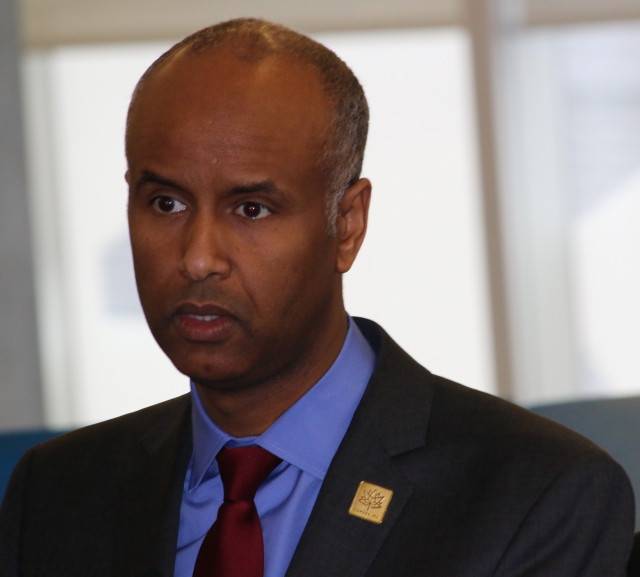Canada has unveiled an ambitious immigration policy to help deal with the future economic impact on the gross domestic product by an aging and retiring population.
The government plans to accept 310,000 permanent residents in 2018, 330,000 in 2019 and 340, 000 in 2020.
Ahmed Hussen, Minister of Immigration, Refugees and Citizenship disclosed this today in Toronto while speaking on Canada’s immigration Plan 2018.
The plan will result in making sure Canada is able to handle its economic growth.
The contribution of immigrants to Canada’s economy was accentuated at the news conference by the introduction of the Minister by Ali Asari, The CEO of Tulip.
Tulip is a retail software application company with fortune 500 customers.
Ali Asari whose mother came to Canada as a refugee was able to establish a business that now contributes immensely to Canada’s economy.
“Immigration is key to our future,” remarked Minister Hussen. “It strengthens our country and keeps us competitive.”
“At a time when some countries are slamming their doors on immigrants, Canada is taking an opposite approach on immigration.”
Canada is focusing on getting 60% of immigrants through the economic stream. It hopes to achieve this through such programs as the Provincial Nominee Program, which helps regions meet their economic needs.
The country would benefit from international students and foreign workers who choose to become permanent residents. The settlement of this class will be facilitated since they are already speaking the language and ready to contribute to the labour force.
The government will not neglect refugees and those vulnerable as it focuses on the economic stream of migration, according to Minister Hessen.
Canada’s private sponsorship of refugees is becoming a model that some countries would want to emulate because of its success in resettling the most vulnerable from war torn countries.
Canada is also making it a priority to help speakers of the French language that want to come to Canada integrate and contribute to the economy. Speaking French will earn an additional point to become a permanent resident.
The government plans to encourage immigrants to spread out and settle in Canada’s secondary cities.
Minister Hussen noted that the Atlantic Immigration Pilot Program has made it easy for employers to assist in the process of settling a newcomer and in addition, the Labour Market Impact Assessment has been eliminated.
He noted that international students who studied in Nova Scotia and start a business in the province could have a path way to becoming a permanent resident.
Minister Hussen said while Canada planned to increase the immigration numbers, the country would not lose sight of the economic and security challenges.







